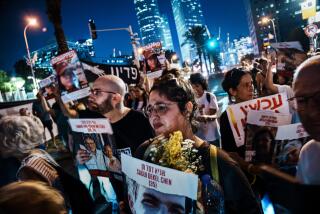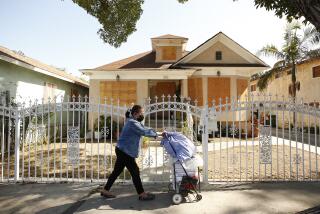‘Hanging On by a Thread’ of Hope
LONDON — As soon as Neetu Jain was evacuated from Euston Station after the bombings on London’s Underground, she called her boyfriend and sister to let them know she was safe and would be catching a bus to her office.
That was the last anyone heard from her.
Jain’s loved ones fear the 37-year-old North London woman escaped the carnage on the subway only to catch the ill-fated No. 30 double-decker bus that exploded at Tavistock Square at 9:47 a.m. For now, she is one of the dozens of people still reported missing more than a day after the bombings.
“I’m hanging on by a thread,” her boyfriend, Gous Ali, said of his receding hopes of finding a bearable explanation for her failure to turn up at work, home or a hospital.
The aftermath of the bus blast was so gory that it took Metropolitan Police more than 30 hours to determine that 13 bodies were in the wreckage, not just the three intact corpses initially reported. Several bodies also still lay uncollected in a tunnel of the Piccadilly line because of the risk to rescue workers from noxious fumes and cave-ins.
Despairing of police advice that he be patient and wait for news from Scotland Yard’s special investigation unit, Ali tried to reach the scene of the bus explosion Friday. He was turned away by police who had cordoned off the blast site for two blocks in all directions.
“She was outside the Tube station just a few minutes earlier,” Ali, 32, said as he gazed at the opaque white fence police had erected around the bus wreckage. “She’d tried to call me, but my phone was off. I just had a missed call number. Then she rang her sister to say she was all right.”
In desperation, Ali distributed pictures of Jain to British TV and newspapers, hoping to spur recollection among emergency medical workers who might have seen or treated her. In the pictures, Jain smiles softly, her dark eyes alight and her long black hair falling in thick curls to her shoulders.
Ali, a Muslim, said he and Jain, a Hindu, began dating two years ago and although they were not yet engaged, “we were moving in that direction.”
Ali denounced the attackers as traitors to Islam, saying, “I’d like to ask them why anyone would do this, because I am of the same faith.”
Ali was at work at his property development agency in Loughborough, a three-hour drive north of London, when he heard the news of the attacks early Thursday. He switched on his cellphone, saw the missed call from Jain and called her back. When she didn’t answer, he called her sister and learned of the earlier call.
Dialing repeatedly on the drive back to London, his anxiety escalated as hours passed with no word from Jain.
“It would have been going in her direction,” Ali said of the doomed bus, his voice choking with emotion as he worked out the distressingly plausible logistics.
Jain had called her sister, Reetu, at 9:37 a.m., relating the chaotic exodus from Euston Station that interrupted her normal commute from Hendon through King’s Cross Station, the site of one bombing. Her train had been stopped and all passengers evacuated.
Together with Jain’s sister and septuagenarian parents, Ramesh and Vijay, Ali went from hospital to hospital in search of information, an exasperating quest that remained fruitless 36 hours after the explosions.
“It’s just a nightmare,” Ali said, recalling the harried emergency room personnel unable to identify those they were treating and police referring his queries to the overwhelmed investigation center.
“The disaster bureau hasn’t helped one bit,” Ali said. “I understand that there have been thousands of people affected by this and that everyone is going through the same thing. But that doesn’t take any of the pain away from this one individual.”
Police have no reliable estimate of the number of people reported missing, spokesman Paul Clark said. A hotline established after the blasts took more than 100,000 calls in the first 24 hours, many of them from people concerned about someone who hadn’t been in touch but has probably since surfaced.
Relatives and friends of the missing told of exasperating bureaucracy and bottlenecks as they sought or offered help to find them.
“If we did what police told us, to sit at home and wait patiently, we’d never learn anything,” complained Priya Walia, whose friend Anthony Fatayi-Williams had called just before the bombings began to say he was en route to pick up a briefcase he’d left at her Bond Street apartment. “We called to say we could bring in pictures, if that would help, but they haven’t even called back to take our information.”
Walia said police also had declined to follow up on an offer by Fatayi-Williams’ cellular phone provider to track its location via his GPS service.
“You just don’t know what to do in this situation,” Walia said. “We just want to find him.”
Mike Matsushita, a 37-year-old Vietnamese American who left a finance job in New York after the Sept. 11 attacks, had just moved from Vietnam to London a month ago to join his British fiancee, Rosie Cowan. He left their home in Islington at 8:15 a.m. en route to his third day on the job at a West London travel agency. His new commute aboard the Piccadilly line through King’s Cross Station would have put him near the scene of the 8:56 a.m. blast aboard a northbound train on that route.
Cowan, 27, encountered the same chaotic scenes and lack of answers as others worried over the missing when she combed hospitals and ambulance teams throughout the city for a second day Friday. But she hadn’t given up hope of finding Matsushita alive.
“We’ve been told there are still some people in the hospitals that haven’t been identified,” said Cowan’s friend Robyn Nixon. “The crisis line did say there is still a chance of positive news.”
Nixon, speaking of fears that Matsushita was caught up in the explosion, said, “There is no reason to think anything else could have happened. He’s not the kind of person to just take off somewhere.” Cowan and Matsushita planned to marry in the fall.
Rescue workers at the chaotic blast scenes confirmed that some of the dead were not identifiable.
“In a confined space like a crowded bus or underground train, the effects of a blast can be very, very traumatic indeed,” said Seamus Kelly, commissioner for the St. John Ambulance charity that deployed 100 volunteers and 33 vehicles to augment the overwhelmed London city service. Drivers reported back scenes of appalling injuries, he said, in particular from the bus blast.
Ali and Reetu Jain got word late Friday that St. Mary’s Hospital had an unidentified female casualty, and they dashed across the city at 10 p.m. to see what they could find out. Two hours later, hospital staff told them it wasn’t his missing girlfriend.
“We went on our own -- no one called us,” Ali said. “We still don’t know any more, but we have to keep trying.”
More to Read
Sign up for Essential California
The most important California stories and recommendations in your inbox every morning.
You may occasionally receive promotional content from the Los Angeles Times.











